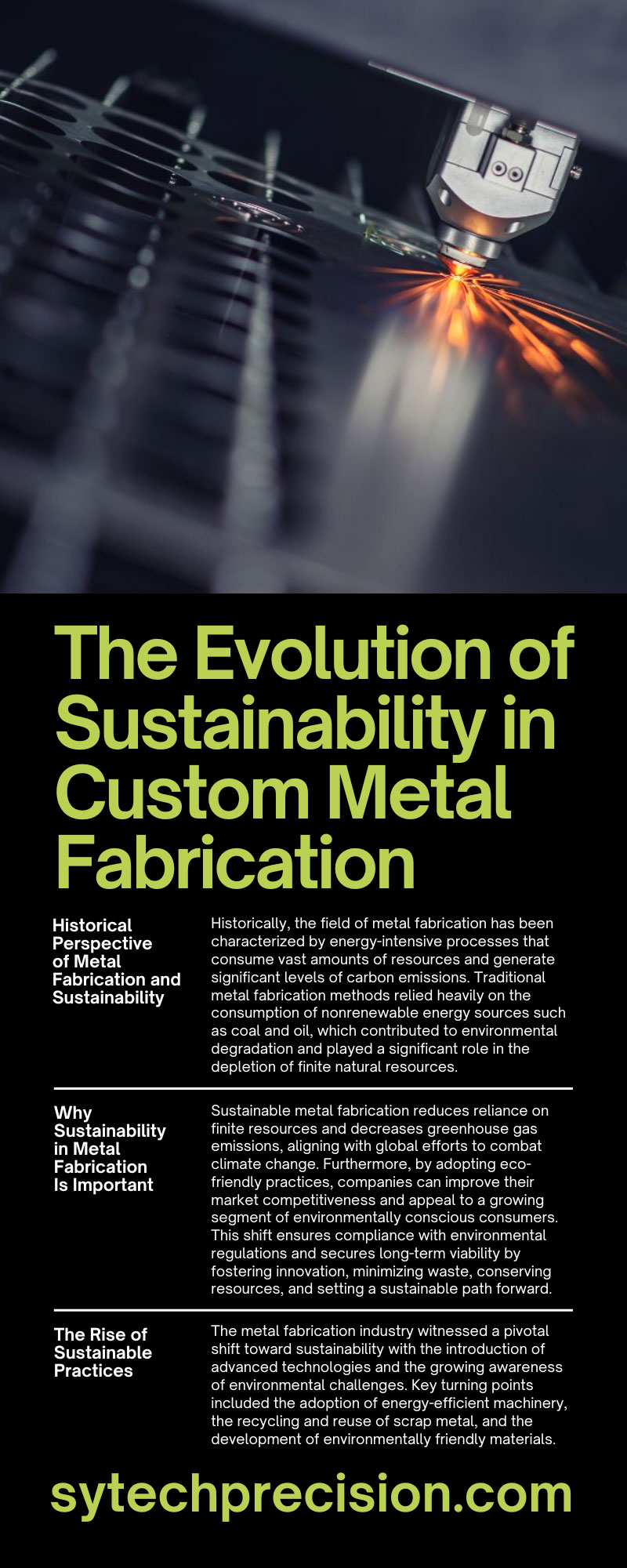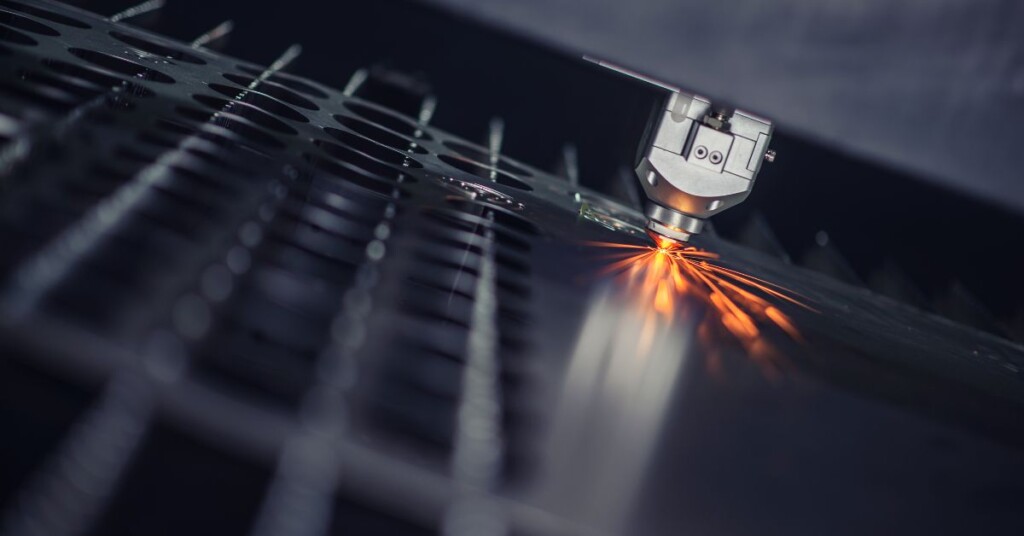The custom metal fabrication industry has long been the backbone of the manufacturing sector, crafting metal structures and components that form the very infrastructure of our modern world. However, as we progress into an era where the environmental impact of manufacturing processes is under scrutiny, the importance of sustainability has never been more paramount.
The shift toward sustainable practices is not merely a trend but a necessary evolution to mitigate the environmental footprint of metal fabrication processes. Below, we explain the evolution of sustainability in custom metal fabrication, from its beginnings to its best practices and future.
Historical Perspective of Metal Fabrication and Sustainability
Historically, the field of metal fabrication has been characterized by energy-intensive processes that consume vast amounts of resources and generate significant levels of carbon emissions. Traditional metal fabrication methods relied heavily on the consumption of nonrenewable energy sources such as coal and oil, which contributed to environmental degradation and played a significant role in the depletion of finite natural resources.
The detrimental impact of these traditional metal fabrication practices on the environment has prompted a critical reevaluation of existing methodologies. This reevaluation has led to the progressive integration of more sustainable, environmentally friendly practices within the industry. These innovative approaches not only contribute to reducing carbon emissions but also aim at conserving natural resources, thereby fostering a more sustainable and eco-friendly future for metal fabrication.
Why Sustainability in Metal Fabrication Is Important
One cannot overstate the imperative for sustainability within the metal fabrication industry. This stems from a confluence of escalating environmental challenges, regulatory pressures, and changing consumer demands, which collectively necessitate a paradigm shift in manufacturing metal products. Metal fabricators, by integrating sustainable practices, not only adhere to increasing regulatory standards aimed at minimizing environmental impact but also enhance their operational efficiency.
Sustainable metal fabrication reduces reliance on finite resources and decreases greenhouse gas emissions, aligning with global efforts to combat climate change. Furthermore, by adopting eco-friendly practices, companies can improve their market competitiveness and appeal to a growing segment of environmentally conscious consumers. This shift ensures compliance with environmental regulations and secures long-term viability by fostering innovation, minimizing waste, conserving resources, and setting a sustainable path forward.
The Rise of Sustainable Practices
The metal fabrication industry witnessed a pivotal shift toward sustainability with the introduction of advanced technologies and the growing awareness of environmental challenges. Key turning points included the adoption of energy-efficient machinery, the recycling and reuse of scrap metal, and the development of environmentally friendly materials.
Recycling in Metal Fabrication
Sustainable metal fabrication practices entail a multifaceted approach to minimizing the environmental impact of manufacturing processes. Recycling stands at the forefront of these practices, enabling sheet metal fabrication to substantially lower its demand for raw materials by repurposing scrap metal, which in turn reduces landfill waste and saves energy. This mitigates the carbon footprint of metal fabrication and reduces costs for fabricators by maximizing the utilization of existing resources.
Energy-Efficient Machinery
Energy-efficient machinery represents another critical aspect, incorporating advanced designs that consume less electricity and yield higher productivity rates, thus lowering the carbon footprint associated with fabrication operations. This evolution of sustainability in custom metal fabrication has also seen the integration of renewable energy sources, such as solar and wind power, in fabrication processes to further reduce dependence on nonrenewable resources.
Environmentally Friendly Materials
The transition toward environmentally friendly materials in metal fabrication is pivotal, involving the use of metals that are not only durable but also more recyclable and sourced from suppliers who adhere to sustainable mining practices. These materials often require less energy for processing and are lighter, reducing energy consumption during transportation. By embracing these materials, fabricators can align their operations with sustainable practices and meet the ever-evolving demands of environmentally conscious consumers.
Green Innovations in Metal Fabrication
Today, the industry’s commitment to sustainability is evident in the latest technologies and materials employed in metal fabrication. Innovations such as 3D printing have revolutionized the sector, allowing for the precise fabrication of components with minimal waste.
Additionally, using renewable energy sources to power operations has significantly reduced the carbon footprint of metal fabrication processes. integrating green chemistry principles in metal fabrication has also drastically reduced the use of toxic chemicals and waste generation.
Benefits of Sustainable Metal Fabrication
The environmental advantages of sustainable metal fabrication are clear, with significant reductions in waste production, energy consumption, and greenhouse gas emissions.
Reduce Waste
By actively minimizing waste production and maximizing the utilization of recyclable materials, fabricators play a crucial role in reducing the volume of material destined for landfills. This reduction not only alleviates the environmental burden associated with waste disposal but also conserves natural resources by promoting the reuse of materials.
These practices contribute to a circular economy, where suppliers and manufacturers maintain the value of products and materials for as long as possible, reducing the need for new resources and lowering the environmental impact. This approach not only benefits the planet by preserving its ecosystems but also offers economic advantages by optimizing resource efficiency.
Reduce Energy Consumption
Sustainable practices in metal fabrication, through the implementation of advanced technologies and the integration of renewable energy sources, have the power to significantly lower energy consumption. By adopting these eco-friendly methods, companies can achieve a reduction in operational costs and save money.
These practices are crucial in mitigating the environmental impact associated with metal fabrication processes. This not only helps in conserving natural resources but also contributes to the overall well-being of the planet, making it a win-win situation for both the industry and the environment.
Green Branding and Reputation
Embracing sustainability in metal fabrication not only contributes to environmental conservation but also significantly enhances a company’s brand and reputation in the modern market. In today’s world, consumers are becoming increasingly aware of the environmental impact of their purchases and are actively seeking out companies that prioritize sustainable practices.
Demonstrating a commitment to sustainability can attract a growing segment of environmentally conscious customers, thereby not only doing good for the planet but also boosting the company’s image and appeal in the eyes of consumers who value corporate responsibility.
Challenges and Future Outlook
Despite the advancements in sustainable practices, the industry faces challenges in fully integrating these methods into all aspects of metal fabrication. Financial barriers, technological limitations, and resistance to change remain obstacles to achieving complete sustainability.
However, the future outlook for sustainability in metal fabrication is positive. Continued innovation and technological advancements promise further reductions in environmental impact. Moreover, the growing global emphasis on sustainability suggests that regulatory pressures and market demands will continue to drive the industry toward greener practices.
Find Precise and Sustainable Metal Fabrication Services at Sytech Inc.
We hope our deep dive into sustainability in the metal fabrication industry has shown how fabricators are employing new practices to embrace a green future. If you ever need metal fabrication services, Sytech Inc. offers state-of-the-art equipment, experienced operators, and commitment to our customers. Learn more about our fabrication services and get a quote for our services today!

